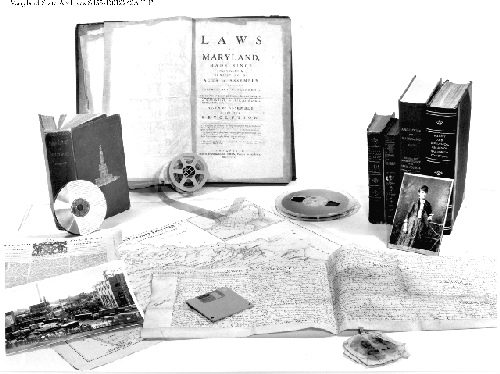Preserving and Accessing Maryland's History
Testimony before the Subcommittee on Public Safety and Administration
of the Appropriations Committee
Maryland House of Delegates
by Dr. Edward C. Papenfuse, Jr., State Archivist
February 3, 2000
on the Proposed Budget for the Maryland State Archives for FY
2001

Madam Chairman, Members of the Committee:
My name is Ed Papenfuse, Archivist of the State of Maryland. With
me this afternoon is Chris Allan, Deputy Archivist.
There are three issues addressed by Mr. Fischer in his budget analysis
that I would like to respond to in some detail, but first I would like
to express our appreciation to him for a most thorough and expert analysis
in which we concur in all but two points.
We agree that our vision statement needs to be more concise and explicit
and will make every effort next year to meet his concerns. We have been
so much engaged in seeking non-General Fund support for our legal mandates
that we have failed to be clear in explaining the central mission of an
Archives which is to preserve and explain the value of the records
entrusted to our care by law. Indeed the hardest task before us as
professionals is finding the most cost-effective ways to enhance the public's
understanding of the value of those records. Generally we always
lack funding for proper appraisal, description and preservation of records
we identify as having permanent value, which brings me to the two points
of disagreement that we have with the analysis.
We would like to request that the Committee not concur in the reduction
of $20,000 in contractual monies. We do understand that that amount
is based upon our difficulties last year in hiring programming and technical
staff, but what is requested this year is for intern staff for which we
will have no difficulty in recruiting and for which we will need the money
at the very beginning of the fiscal year. That $20,000 is for staff
to work on Maryland Legal History On Line and the records preservation
initiatives in the budget (the Martenet and Phillips collections) which
should be in place and working on July 1, 2000, assuming the funding is
left in the budget.
We would also like to respectfully request that the whole matter of
the Archives paying rent for space used to generate income for its legally
mandated functions be tabled and the whole amount removed from the
budget for FY2001, until the questions raised by Mr. Fischer are addressed
by the Department of Budget and Management, the Department of General Services,
and the Archives' counsel. The law permitting us to raise money for
legally mandated functions does not appear to permit the use of such funds
for building maintenance, and it also appears that the legislative intent
of the law appropriating funds for a separately maintained Archives building
was for General Funds to be used for maintenance. After requests
to appropriate personnel, we finally were able to obtain a copy, this morning,
of the Space Management policy upon which the assessment was based.
Apart from the legal issue of required notice upon occupancy (we began
occupying our building in 1986 and received no such notice) and, apart
from the question of whether it was ever intended that the Archives should
charge itself rent for income producing activities, the application
as presented in the budget before you of the formula stated in the manual
appears to be in error. The formula is "net square feet occupied
[by non-general fund income producing programs] x Rental Rate [said to
be $11.99 per square foot] times [the] % of Federal, Special or other non-General
Funds = total rent." By that formula we have 2,235 sf allocated
to income producing programs and 29% of our total appropriation is from
Special Funds. That means that if the formula is applied to
the Archives the most we should be appropriating from Special Funds to
pay rent is no more than $7,771.31. [2,235 x $11.99 x .29%].
If it is decided that rent should be paid for space used for revenue generating
projects at the Archives, we would also like to request that language be
inserted in the appropriation bill that requires such monies to be applied
to maintenance on the Hall of Records building exclusively.
With regard to the ways in which we are adding value to our understanding
of Maryland history by preserving and describing records within the context
of our pioneering efforts to bring reliable information to the public through
our world wide web site, we have brought along some examples and handouts
which I would like to refer to informally and then make ourselves available
for any questions you may have.
